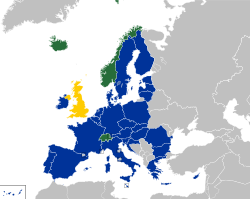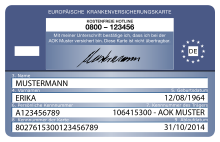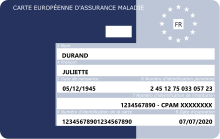
The European Free Trade Association (EFTA) is a regional trade organization and free trade area consisting of four European states: Iceland, Liechtenstein, Norway and Switzerland. The organization operates in parallel with the European Union (EU), and all four member states participate in the European Single Market and are part of the Schengen Area. They are not, however, party to the European Union Customs Union.
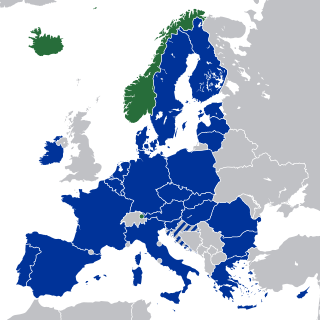
The European Economic Area (EEA) was established via the Agreement on the European Economic Area, an international agreement which enables the extension of the European Union's single market to member states of the European Free Trade Association. The EEA links the EU member states and three of the four EFTA states into an internal market governed by the same basic rules. These rules aim to enable free movement of persons, goods, services, and capital within the European single market, including the freedom to choose residence in any country within this area. The EEA was established on 1 January 1994 upon entry into force of the EEA Agreement. The contracting parties are the EU, its member states, and Iceland, Liechtenstein, and Norway. New members of EFTA would not automatically become party to the EEA Agreement, as each EFTA State decides on its own whether it applies to be party to the EEA Agreement or not. According to Article 128 of the EEA Agreement, "any European State becoming a member of the Community shall, and the Swiss Confederation or any European State becoming a member of EFTA may, apply to become a party to this Agreement. It shall address its application to the EEA Council." EFTA does not envisage political integration. It does not issue legislation, nor does it establish a customs union. Schengen is not a part of the EEA Agreement. However, all of the four EFTA States participate in Schengen and Dublin through bilateral agreements. They all apply the provisions of the relevant Acquis.
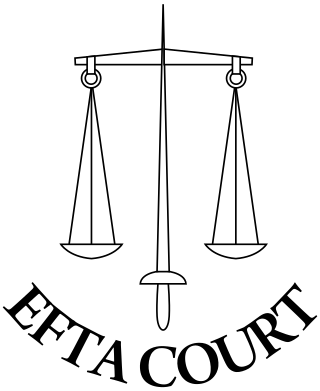
The EFTA Court is a supranational judicial body responsible for the three EFTA members who are also members of the European Economic Area (EEA): Iceland, Liechtenstein and Norway.

The EFTA Surveillance Authority (ESA) monitors compliance with the Agreement on the European Economic Area (EEA) in Iceland, Liechtenstein and Norway (the EEA EFTA States). ESA operates independently of the States and safeguards the rights of individuals and undertakings under the EEA Agreement, ensuring free movement, fair competition, and control of state aid.
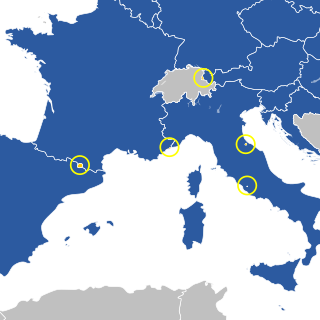
Currently, all of the European microstates have some form of relations with the European Union (EU).

The Citizens' Rights Directive 2004/38/EC sets out the conditions for the exercise of the right of free movement for citizens of the European Economic Area (EEA), which includes the member states of the European Union (EU) and the three European Free Trade Association (EFTA) members Iceland, Norway and Liechtenstein. Switzerland, which is a member of EFTA but not of the EEA, is not bound by the Directive but rather has a separate multilateral sectoral agreement on free movement with the EU and its member states.

The European driving licence is a driving licence issued by the member states of the European Economic Area (EEA); all 27 EU member states and three EFTA member states; Iceland, Liechtenstein and Norway, which give shared features the various driving licence styles formerly in use. It is credit card-style with a photograph. They were introduced to replace the 110 different plastic and paper driving licences of the 300 million drivers in the EEA. The main objective of the licence is to reduce the risk of fraud.
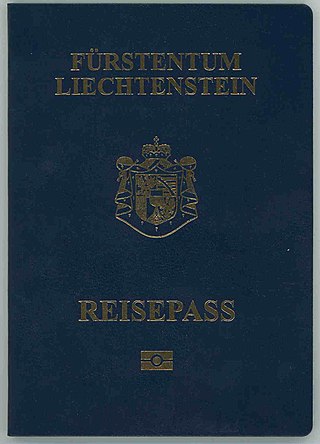
Liechtenstein passports are issued to nationals of Liechtenstein for the purpose of international travel. Beside serving as proof of Liechtenstein citizenship, they facilitate the process of securing assistance from Liechtenstein consular officials abroad.

The European Union itself does not issue ordinary passports, but ordinary passport booklets issued by its 27 member states share a common format. This common format features a coloured cover emblazoned—in the official language(s) of the issuing country —with the title "European Union", followed by the name(s) of the member state, the heraldic "Arms" of the State concerned, the word "PASSPORT", together with the biometric passport symbol at the bottom centre of the front cover.
The EEA Joint Committee is an institution of the European Economic Area (EEA). It is composed of representatives of Iceland, Liechtenstein, Norway, and the European Union. Its main function is to approve the application of European Union directives and regulations in the three EEA states which are not EU members. Once approved by the Committee these modify the EEA Agreement and thus force the three EEA states to implement them. Its decisions are taken by consensus.

An International Motor Insurance Card System is an arrangement between authorities and insurance organizations of multiple states to ensure that victims of road traffic accidents do not suffer from the fact that injuries or damage sustained by them were caused by a visiting motorist rather than a motorist resident in the same country.

The Slovenian identity card is issued to Slovenian citizens. It can be used as a travel document when visiting countries in Europe, as well as Georgia, French overseas territories, Montserrat and organized tours to Tunisia.

The Liechtenstein identity card is issued to Liechtenstein citizens by the Immigration and Passport Office in Vaduz. The card costs CHF65 for adults aged 18 or over and is valid for 10 years. For children, the card costs CHF30 and has a validity of 3 years.

National identity cards are issued to their citizens by the governments of most European Economic Area (EEA) member states, the exceptions are Denmark and Ireland. Ireland however issues a passport card which is a valid document in the EEA and Switzerland. Denmark issues simpler identity cards that are not valid as travel documents. From 2 August 2021, new identity cards are harmonized as a common identity card model replaced the various formats already in use.

The Norwegian identity card, commonly referred to as the national identity card in Norway, is a non-compulsory biometric identity document issued since 30 November 2020. It is one of two official identity documents issued by the Norwegian Police Service, the other being the Norwegian passport. It is only issued to Norwegian citizens, and may indicate citizenship so that it can be used as a travel document facilitating freedom of movement within the European Free Trade Association and the European Economic Area. For travel within the Nordic countries no identity documentation is legally required for Nordic citizens due to the Nordic Passport Union.

The United Kingdom (UK) was a member of the European Economic Area (EEA) from 1 January 1994 to 31 December 2020, following the coming into force of the 1992 EEA Agreement. Membership of the EEA is a consequence of membership of the European Union (EU). The UK ceased to be a Contracting Party to the EEA Agreement after its withdrawal from the EU on 31 January 2020, as it was a member of the EEA by virtue of its EU membership, but retained EEA rights during the Brexit transition period, based on Article 126 of the withdrawal agreement between the EU and the UK. During the transition period, which ended on 31 December 2020, the UK and EU negotiated their future relationship.
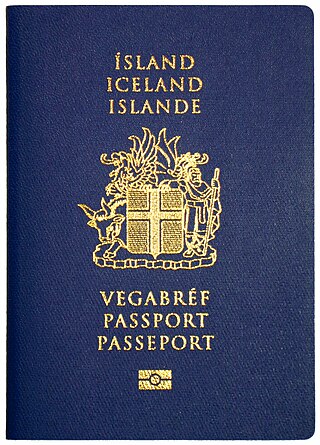
Passports of the EFTA member states are passports issued by the European Free Trade Association (EFTA) member states Iceland, Liechtenstein, Norway and Switzerland. EFTA is in this article used as a common name for these countries.
In British politics, the "Norway-plus model" was a proposal for a post-Brexit settlement, which the British government did not pursue. Proposed in November 2018 as an alternative to the Chequers plan, it would have consisted of membership of the European Free Trade Association (EFTA) and of membership of the European Economic Area (EEA) as an EFTA member state, combined with a separate customs union with the EU to create a trade relationship similar to that between the EU and its member states today, with the exception of the political representation in the EU's bodies. Michel Barnier, the EU's Chief Negotiator, has always said that a model that combined EEA/EFTA and a customs union was one that he would be happy to consider.
The European Union Settlement Scheme is an immigration regime of the United Kingdom introduced by the Home Office in 2019, under the new Appendix EU of the UK's Immigration Rules, in response to the Brexit situation. EUSS processes the registration of nationals of EU and EFTA countries who were resident in the United Kingdom prior to the end of the Brexit transition/implementation period at 11pm GMT on 31 December 2020. Successful applicants receive either 'pre-settled status' or 'settled status', generally depending on the length of time they have been resident in the United Kingdom.

The UK Global Health Insurance Card (GHIC) is a card issued by the NHS Business Services Authority on behalf of the Department for Health and Social Care in the United Kingdom. It is issued free of charge to anyone covered by the social security system of the United Kingdom and provides evidence of entitlement to the provision of healthcare services under the UK's reciprocal healthcare agreements with the European Union, Switzerland, Norway, Iceland, Liechtenstein, Montenegro, Guernsey and some British Overseas Territories. It is also accepted by Australia as proof of eligibility to enrol in Medicare.

